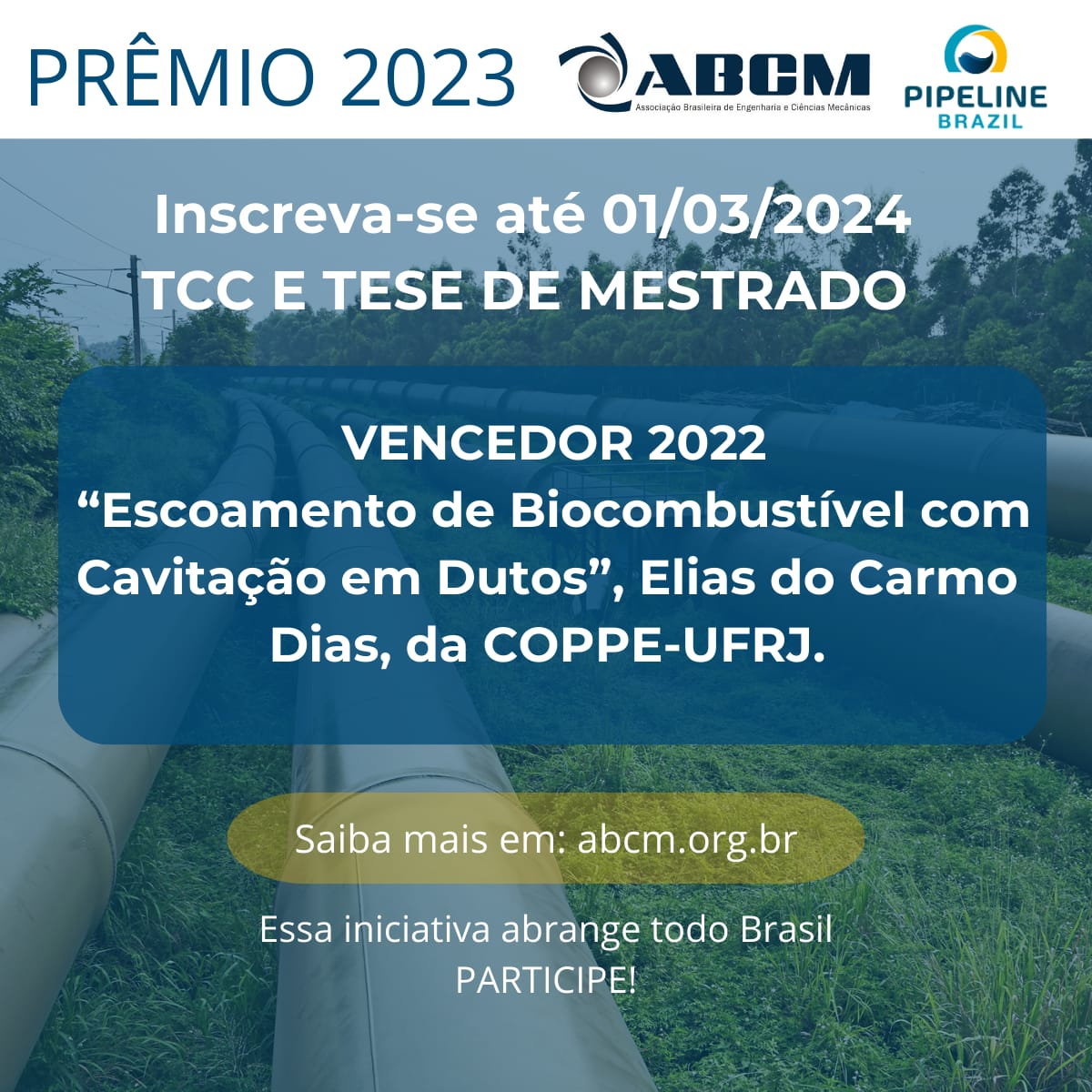Informativos
-
INFORMATIVO ABCM Nº 08/2024
INFORMATIVO ABCM Nº 08/2024
Semana 23 a 29 de Fevereiro de 2024

As inscrições para o Prêmio ABCM-PIPELINEBRAZIL 2023 estão abertas até 01/03!
Para mais informações de como participar, clique aqui.
Concursos e Processos SeletivosVaga de pós-doutorado com bolsa FAPESP
Fonte: Prof. Luben Cabezas Gómez (EESC/USP)
Oportunidade de pesquisa de pós-doutorado em Simulações Numéricas Diretas de Fluidos Supercríticos com bolsa da Fundação de Amparo à Pesquisa do Estado de São Paulo (FAPESP).
Clique aqui para mais informações.
Curso de Extensão em Mob Elétrica UNICAMP
Fonte: UNICAMP

Abertura das inscrições para a 6a edição do curso de Mob Elétrica oferecido pela Escola de Extensão da Unicamp, sob coordenação da profa. Flávia Consoni, o qual já formou mais de 160 profissionais.
As inscrições estarão abertas até o dia 14 de março e o curso terá início no dia 26/ março, com aulas síncronas e no formato remoto, além de um final de semana na Unicamp com atividades práticas. Há condições especiais para mais de uma pessoa da mesma organização.
Clique aqui para mais informações.
CALL FOR POSTDOC POSITIONS AT THE UNIVERSIDAD TÉCNICA FEDERICO SANTA MARÍA (USM)
Source: Prof. Rodrigo Cassineli (USM)
NUMERICAL INVESTIGATION OF AIR-BREATHING PROPULSION SYSTEMS FOR VERY LOW EARTH ORBIT APPLICATIONS
In the last years, there has been a significant increase in satellite launches to Low Earth Orbit (LEO). Nowadays, this orbit, ranging from 400 up to 2000 km, represents the most satellite-populated region around the Earth. Considering that the number of satellites in space orbit is becoming increasingly saturated, Very Low Earth Orbit (lower than 400 km) has become a new choice to expand the satellite operation range and improve mission capability. Low orbits have been avoided due to significant atmospheric drag which induce spacecraft’s orbit decay in less than 5 years. To maintain a satellite at VLEO, it is required the use of continuous low-thrust drag compensation mechanisms. One way to overcome this problem is the use of atmosphere-breathing electric propulsion (ABEP). ABEP is a type of electric propulsion system that uses the atmosphere as a propellant source instead of a stored reservoir. This technology is still in its early stages, but holds the promise of providing a clean, efficient, and sustainable propulsion system for spacecraft, enabling Very Low Earth Orbit (VLEO) mission scenarios. To optimize the ABEP technology, accurately simulating air-based plasma chemistry is crucial. In this scenario, the main objective of this project is to implement, verify, and validate plasma reactions into the CFD code for atmosphere-breathing electric propulsion systems applications.
Institution: Universidad Técnica Federico Santa María
Location: Santiago, Chile
Number of positions: 2
Salary: US$ 27,000.00 per year
Additional: US$ 5,000.00 per year (equipment, conferences, and publications)
The position is available for three years
REQUIREMENTS:
- Ph.D. in fluid dynamics, physics, or applied mathematics with a strong computational background.
- The candidate must have an excellent academic record at all levels of education.
- Experience in the development of OpenFOAM codes and running them on HPC (Mandatory!).
- Understanding of plasma reactions.
- Strong publication record in Q1 and Q2 Journals (Mandatory!).
- The candidate must have excellent written and verbal communication skills, demonstrated through publications in reputed journals. English (minimum B2-Level) and interest in learning Spanish for daily activities.
APPLICATIONS:
Applications should include a cover letter, a brief statement of research interests and achievements (max. 2 pages), CV including the publication list, and two potential referees' names and contact details. The reference persons will only be contacted for the shortlisted candidates.
All applications should be sent to Professor Rodrigo Cassineli Palharini, rodrigo.cassineli@usm.cl




